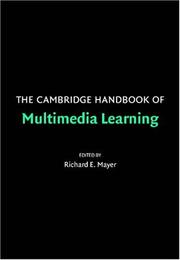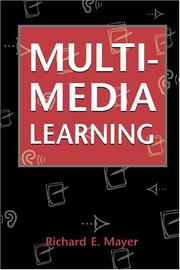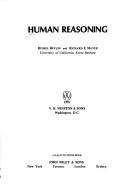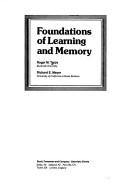| Listing 1 - 10 of 12 | << page >> |
Sort by
|
Multi
ISBN: 9781107610316 9781107035201 1107035201 9781139547369 1107610311 1139990160 113998554X 1139547364 Year: 2014 Publisher: New York, N.Y. Cambridge University Press
Abstract | Keywords | Export | Availability | Bookmark
 Loading...
Loading...Choose an application
- Reference Manager
- EndNote
- RefWorks (Direct export to RefWorks)
In recent years, multimedia learning, or learning from words and images, has developed into a coherent discipline with a significant research base. The Cambridge Handbook of Multimedia Learning is unique in offering a comprehensive, up-to-date analysis of research and theory in the field, with a focus on computer-based learning. Since the first edition appeared in 2005, it has shaped the field and become the primary reference work for multimedia learning. Multimedia environments, including online presentations, e-courses, interactive lessons, simulation games, slideshows, and even textbooks, play a crucial role in education. This revised second edition incorporates the latest developments in multimedia learning and contains new chapters on topics such as drawing, video, feedback, working memory, learner control, and intelligent tutoring systems. It examines research-based principles to determine the most effective methods of multimedia instruction and considers research findings in the context of cognitive theory to explain how these methods work.
Cognitive psychology --- Computer assisted instruction --- Road traffic --- Computer-assisted instruction --- Interactive multimedia --- Computer-assisted instruction. --- Interactive multimedia. --- Interactieve multimedia --- Multimedia --- Hypermedia systems --- Interactive media --- Computer software --- CAI (Computer-assisted instruction) --- Computer-aided instruction --- Computer-assisted learning --- Computer based instruction --- Computer-enhanced learning --- Electronic data processing in programmed instruction --- ILSs (Integrated learning systems) --- Integrated learning systems --- Microcomputer-aided instruction --- Microcomputer-assisted instruction --- Microcomputer-assisted learning --- Microcomputer-based instruction --- Teaching --- Education --- Educational technology --- Programmed instruction --- Telematics --- Data processing --- Educational psychology
Book
ISBN: 9780521514125 9780521735353 9780511811678 9780511506468 0511506465 9780511504327 0511504322 9781139129879 1139129872 0511811675 0521514126 0521735351 0511737696 1107190088 1283330407 9786613330406 1139134914 1139133802 Year: 2012 Publisher: Cambridge Cambridge University Press
Abstract | Keywords | Export | Availability | Bookmark
 Loading...
Loading...Choose an application
- Reference Manager
- EndNote
- RefWorks (Direct export to RefWorks)
Although verbal learning offers a powerful tool, Mayer explores ways of going beyond the purely verbal. Recent advances in graphics technology and information technology have prompted new efforts to understand the potential of multimedia learning as a means of promoting human understanding. In this second edition, Mayer includes double the number of experimental comparisons, 6 new principles - signalling, segmenting, pertaining, personalization, voice and image principles. The 12 principles of multimedia instructional design have been reorganized into three sections - reducing extraneous processing, managing essential processing and fostering generative processing. Finally an indication of the maturity of the field is that the second edition highlights boundary conditions for each principle research-based constraints on when a principle is likely or not likely to apply. The boundary conditions are interpreted in terms of the cognitive theory of multimedia learning, and help to enrich theories of multimedia learning.
Audiovisual methods --- Didactics --- audiovisuele opvoeding --- Computer architecture. Operating systems --- Computer-assisted instruction. --- Interactive multimedia. --- Hypermedia systems --- Interactive media --- Computer software --- CAI (Computer-assisted instruction) --- Computer-aided instruction --- Computer-assisted learning --- Computer based instruction --- Computer-enhanced learning --- Electronic data processing in programmed instruction --- ILSs (Integrated learning systems) --- Integrated learning systems --- Microcomputer-aided instruction --- Microcomputer-assisted instruction --- Microcomputer-assisted learning --- Microcomputer-based instruction --- Teaching --- Education --- Educational technology --- Programmed instruction --- Telematics --- Data processing --- Computer-assisted instruction --- Interactive multimedia --- Health Sciences --- Psychiatry & Psychology

ISBN: 0521547512 0521838738 0511816812 Year: 2005 Publisher: Cambridge : Cambridge University Press,
Abstract | Keywords | Export | Availability | Bookmark
 Loading...
Loading...Choose an application
- Reference Manager
- EndNote
- RefWorks (Direct export to RefWorks)
In the last decade, the field of multimedia learning emerged as a coherent discipline with an accumulated research base that had never been synthesized and organized in a handbook. The Cambridge Handbook of Multimedia Learning, first published in 2005, constituted the world's first handbook devoted to comprehensive coverage of research and theory in the field of multimedia learning. Multimedia learning is defined as learning from words (e.g., spoken or printed text) and pictures (e.g. illustrations, photos, maps, graphs, animation, or video). The focus of this handbook is on how people learn from words and pictures in computer-based environments. Multimedia environments include online instructional presentations, interactive lessons, e-courses, simulation games, virtual reality, and computer-supported in-class presentations. The Cambridge Handbook of Multimedia Learning seeks to establish what works (that is, to ground research in cognitive theory), and to consider when and where it works (that is, to explore the implications of research for practice).
371.694 --- #PBIB:2005.4 --- Geprogrammeerde instructie. CAI. Leermachines. Computerbegeleid onderwijs. --- 371.694 Geprogrammeerde instructie. CAI. Leermachines. Computerbegeleid onderwijs. --- Audio-visual education --- Computer-assisted instruction --- Interactive multimedia --- Educational technology --- Teaching --- Instructional materials personnel --- Visual education --- Hypermedia systems --- Interactive media --- Computer software --- Geprogrammeerde instructie. CAI. Leermachines. Computerbegeleid onderwijs --- Handbooks, manuals, etc. --- Health Sciences --- Psychiatry & Psychology
Book
ISBN: 0673391876 0316551511 9780316551519 9780673391872 Year: 1987 Publisher: Boston Little, Brown
Abstract | Keywords | Export | Availability | Bookmark
 Loading...
Loading...Choose an application
- Reference Manager
- EndNote
- RefWorks (Direct export to RefWorks)
Pedagogiek en onderwijskunde --- psychologische pedagogiek --- psychologische pedagogiek. --- Educational psychology --- Education --- Psychology

ISBN: 0521787491 0521782392 1139164600 9780521787499 9780521782395 Year: 2001 Publisher: Cambridge : Cambridge University Press,
Abstract | Keywords | Export | Availability | Bookmark
 Loading...
Loading...Choose an application
- Reference Manager
- EndNote
- RefWorks (Direct export to RefWorks)
800.515 --- 084 --- 084 Grafische voorstellingen. Illustraties. Audio-visuele documentatie. Multimedia --- Grafische voorstellingen. Illustraties. Audio-visuele documentatie. Multimedia --- 800.515 Computerondersteunend (taal)onderwijs. Computer Assisted Language Learning --- Computerondersteunend (taal)onderwijs. Computer Assisted Language Learning --- Computer-assisted instruction --- Interactive multimedia --- Hypermedia systems --- Interactive media --- Computer software --- CAI (Computer-assisted instruction) --- Computer-aided instruction --- Computer-assisted learning --- Computer based instruction --- Computer-enhanced learning --- Electronic data processing in programmed instruction --- ILSs (Integrated learning systems) --- Integrated learning systems --- Microcomputer-aided instruction --- Microcomputer-assisted instruction --- Microcomputer-assisted learning --- Microcomputer-based instruction --- Teaching --- Education --- Educational technology --- Programmed instruction --- Telematics --- Data processing --- Computer-assisted instruction. --- Interactive multimedia. --- #BAVD --- #PBIB:2001.4 --- #SBIB:309H501 --- #SBIB:316.334.1O400 --- Mediapedagogiek (incl. mediadidactiek) --- Leer- en onderwijsgedrag: algemeen --- Health Sciences --- Psychiatry & Psychology --- Enseignement multimedia

ISBN: 047099357X 9780470993576 Year: 1978 Publisher: New York Wiley & Sons
Abstract | Keywords | Export | Availability | Bookmark
 Loading...
Loading...Choose an application
- Reference Manager
- EndNote
- RefWorks (Direct export to RefWorks)
Cognitive psychology --- Educational psychology --- Reasoning --- Reasoning.
Book
ISBN: 1316258475 1316258572 131625867X 1316258599 1316258696 1107687977 1107707080 1316258718 1316258653 1316258637 1107069912 1322561176 9781316258699 9781107069916 9781107687974 9781107707085 9781316258651 9781316258712 Year: 2015 Publisher: New York Cambridge University Press
Abstract | Keywords | Export | Availability | Bookmark
 Loading...
Loading...Choose an application
- Reference Manager
- EndNote
- RefWorks (Direct export to RefWorks)
During the past twenty-five years, researchers have made impressive advances in pinpointing effective learning strategies (namely, activities the learner engages in during learning that are intended to improve learning). In Learning as a Generative Activity: Eight Learning Strategies that Promote Understanding, Logan Fiorella and Richard E. Mayer share eight evidence-based learning strategies that promote understanding: summarizing, mapping, drawing, imagining, self-testing, self-explaining, teaching, and enacting. Each chapter describes and exemplifies a learning strategy, examines the underlying cognitive theory, evaluates strategy effectiveness by analyzing the latest research, pinpoints boundary conditions, and explores practical implications and future directions. Each learning strategy targets generative learning, in which learners actively make sense out of the material so they can apply their learning to new situations. This concise, accessible introduction to learning strategies will benefit students, researchers, and practitioners in educational psychology, as well as general readers interested in the important twenty-first-century skill of regulating one's own learning.
Learning ability. --- Learning strategies. --- Strategies, Learning --- Learning, Psychology of --- Ability --- Active learning. --- Action learning --- Activity learning --- Activity teaching --- Learning --- Experiential learning --- Active learning --- Learning ability --- Learning strategies
Book
ISBN: 110889433X 1108841589 1108897371 1108898637 9781108894333 Year: 2022 Publisher: Cambridge : Cambridge University Press,
Abstract | Keywords | Export | Availability | Bookmark
 Loading...
Loading...Choose an application
- Reference Manager
- EndNote
- RefWorks (Direct export to RefWorks)
Digital and online learning is more prevalent than ever, making multimedia learning a primary objective for many instructors. The Cambridge Handbook of Multimedia Learning examines cutting-edge research to guide creative teaching methods in online classrooms and training. Recognized as the field's major reference work, this research-based handbook helps define and shape this area of study. This third edition provides the latest progress report from the world's leading multimedia researchers, with forty-six chapters on how to help people learn from words and pictures, particularly in computer-based environments. The chapters demonstrate what works best and establishes optimized practices. It systematically examines well-researched principles of effective multimedia instruction and pinpoints exactly why certain practices succeed by isolating the boundary conditions. The volume is founded upon research findings in learning theory, giving it an informed perspective in explaining precisely how effective teaching practices achieve their goals or fail to engage.
Computer-assisted instruction. --- Interactive multimedia. --- Hypermedia systems --- Interactive media --- Computer software --- CAI (Computer-assisted instruction) --- Computer-aided instruction --- Computer-assisted learning --- Computer based instruction --- Computer-enhanced learning --- Electronic data processing in programmed instruction --- ILSs (Integrated learning systems) --- Integrated learning systems --- Microcomputer-aided instruction --- Microcomputer-assisted instruction --- Microcomputer-assisted learning --- Microcomputer-based instruction --- Teaching --- Education --- Educational technology --- Programmed instruction --- Telematics --- Data processing

ISBN: 0673150747 Year: 1978 Publisher: Glenview, Ill. Scott, Foresman
Abstract | Keywords | Export | Availability | Bookmark
 Loading...
Loading...Choose an application
- Reference Manager
- EndNote
- RefWorks (Direct export to RefWorks)
Cognitive psychology --- Learning --- Memory --- Learning, Psychology of --- Psychologie de l'apprentissage --- Mémoire --- 159.95 --- Retention (Psychology) --- Intellect --- Psychology --- Thought and thinking --- Comprehension --- Executive functions (Neuropsychology) --- Mnemonics --- Perseveration (Psychology) --- Reproduction (Psychology) --- Psychology of learning --- Educational psychology --- Learning ability --- Geestelijke functies --- Psychological aspects --- Learning, Psychology of. --- Memory. --- 159.95 Geestelijke functies --- Mémoire --- Learning.
Book
ISBN: 0673151107 Year: 1979 Publisher: Glenview Scott, Foresman
Abstract | Keywords | Export | Availability | Bookmark
 Loading...
Loading...Choose an application
- Reference Manager
- EndNote
- RefWorks (Direct export to RefWorks)
Conditioned response --- -Memory --- -Psychology, Comparative --- -#PEDA *P 1.6 --- #PEDA *P 1.7 --- #PEDA *P 1.82 --- Behavior, Comparative --- Comparative behavior --- Comparative psychology --- Ethology, Comparative --- Intelligence of animals --- Zoology --- Animal behavior --- Animal intelligence --- Animal psychology --- Human behavior --- Instinct --- Retention (Psychology) --- Intellect --- Psychology --- Thought and thinking --- Comprehension --- Executive functions (Neuropsychology) --- Mnemonics --- Perseveration (Psychology) --- Reproduction (Psychology) --- Conditional reflexes --- Conditional response --- Conditioned reflexes --- Response, Conditioned --- Association of ideas --- Behaviorism (Psychology) --- Learning, Psychology of --- Reflexes --- Habituation (Neuropsychology) --- Addresses, essays, lectures --- Conditioned response. --- Memory. --- Psychology, Comparative. --- Memory --- Psychology, Comparative --- #PEDA *P 1.6
| Listing 1 - 10 of 12 | << page >> |
Sort by
|

 Search
Search Feedback
Feedback About UniCat
About UniCat  Help
Help News
News